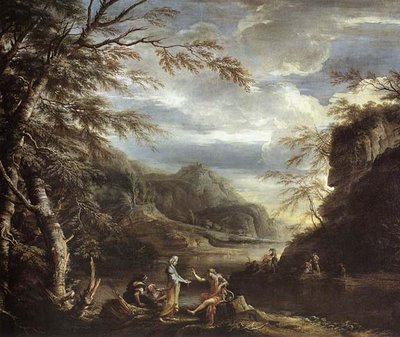Blue Oracles

DEAD ME SCROLLS
Nov. 23
Bacis, like Musaeus, is little more than a name to which the authorship of oracles was conveniently referred. Men naturally turn to oracles in times of crisis, so it was only to be expected that the pronouncements of the best-known legendary prophet should have been widely quoted and credited during the Persian War. ... There existed ... if Herodotus’ sources are accurate, a corpus of oracles which were referred to Bacis at the end of the sixth century BC.
-- John Pollard, Seers, Shrines and Sirens
Here in this blue scriptorium
at the bottom of the night
I write the old truths down.
Each squirt of ink across
the page is another oracle
from behind of what’s ahead.
In the turning and reversing
of the dream my compass
has inverted toward Your
sooth, and the news
I seek is that which leads
me better ie further back;
prophecy thus foretells
what lies uncovered on
the next page, revealing
the contours of the
digs like occiputs of
a long-buried skull
intoning tomorrow’s song.
I’ve filled scroll after scroll
of this blue-boned sooth,
shelving it in a library
that’s between just
me and You, salt father,
half of the corpus
piled up in an aging
man’s singing mind,
the other half
one tiny nook of
drowned Alexandria
glowing eerie and feral
at the bottom of the
writable sea.
I read and the well
clears its throat; I write
and something low
and old pours an urgent
sweet cold draught
of pure silver through
my pen’s mouth,
hauled up from the
deepest sea of all
down Lascaux’s
singing vaults. I have
no idea who this serves,
if anyone at all -- for
me a myriad compulsions
& vanities dross the
gold it mines; it’s vatic
and fool-savant too,
unerringly binding me
to a cobalt metronome
droning metrically
in whiskey-malted
preter-tequila-salted
singsong dirty rhymes.
Its oblique wings are
nigh impossible
for the tribe, lost
amid a zillion
more accessible
acceptable & fun
ways to roar & fly.
The oracles pile on
shelves to
grey and crumble
in the fall of this
man’s life: A library
for the sack
and burning, the
flame which pyres
dreams. Perhaps that’s
what these tongues
were crying for but
got trapped instead in
bony margins, between
these ears too-sexualized
seams. Maybe with
my final sigh
these dead me scrolls
will release You at last
to swim naked and
free upon the
wave which washes
through us all.
What’s curious today
is that these curios
hold magic thrall
for just an hour
apiece: each waking
rings a new bell
in the prophet’s starry
mind, causing him
to haruspicate a new
reading of the ancient
text, the next inside
account which is
good only for that day’s
song, then shelves
in shadow with the rest,
amassing somewhere behind,
down digestion’s tract
where history is shat
& lies amid its ochred
precedents. The topmost layer
is what I add before
I too am gone.
Yesterday’s sooth
is forgettable, tomorrow’s
too vague to tell:
only now do the
vast flukes
smash and hammer
the oracles of Bacis
which, it is said,
were stored in a
sacred cache like
the inmost vault
of Grecian destiny,
regardless whether
they were true or not.
Those oracles had the
gleam of a proof
that reads two ways
at once, offering
not one truth from
the deep but two:
Words from a mouth
perplex and blue
and shifty as the sea,
rollers of salt wilderness
retaining their
emboldened shape
in ten thousand
scrolls lined up
in rows down down
down this page.
It’s interesting to
me at least, today,
enough to stopper
the whole dingdong
wash between what
begins and ends today
in this spout of
spuming verse. And
now that I’m done
the meat cools fast,
leaving just a skull
of paper stone,
that dead and
bleached seas’s
scroll I am, if such a
thing exists, if there’s
any truth that all this
sooth could live
here way back there
and thus to glory
row hereafter.

SIBYLLYA
Nov. 24
The female counterpart of Bacis was Sibylla, whose name and origin alike have resisted analysis. She is first described by the philosopher Heraclitus “with raging lips uttering prophecies grave, stark and unadorned.” At some stage she was pluralized, but all her early associations are with the east, whether Phrygia, Babylon, Libya or the Troad. Being legendary figures, the dates of the various Sibyls are obscure and vary in the authorities from the pre-Trojan era to the time of Solon. Best known in later times was the Erythrean Sibyl, whose cave in Asia Minor has been discovered, but it is perhaps not without significance that the oracles quoted all refer simply to a single prophetess... It seems likely that the Sibylline tradition moved west with the colonizers, and reached Cumae and Delphi too. ... Whether the Sibyl was a female shaman, or whether she had always claimed to be inspired by Apollo, we do not know.
-- John Pollard, Seers, Shrines and Sirens
She haunts a far-Eastern cave
in my ear, singing eerie and
low in the wave-lashed voice
of rear things in their cove
distant and strange and
ferociously blue, like the
conch’s drowned insides
softly roaring all things true.
She pronounces to soul birds
the inside names of the world,
flinging wide my thought’s wings
like an unquiet wave hungry
for shores in full gusto of
pent roar of a man
whose blue balls cry
for harbor at last
where he can unload
the full freight of wet
dreams stored in bursting
barrels just below.
What she says never makes
sense when I hear it at first;
it’s like news from a far land
in a foreign-bourned and
brawling twang, a brogue
two-fisted in meter
with a dark meaning in
its wake, smashing like
flukes her full import
much later in the tale,
the oracle breeching
and leaping like a
black exultant whale.
The maid who helped
my mother keep house
in Pittsburgh when I was
three would call to me
“Pretty girls walking by!”
and laugh as I raced
to the front window for
what the day delved for
my view. She’d say to
my mother, “He ain’t
gonna be nothin’ but a
lover!” The fins of my
frenzy were as obvious
to her as they became
to me, and the imperious
shading of her oracle
haunts my words for
world to this day.
A lover and that’s all,
a daunting egreeser
of Cupid’s salt tide,
beseeching curved wavelet
for a peek up inside
their pretty blue skirts
as life passed forever by,
taking with them in
those velveteen mysteriums
all I must ride to
the ends of all seas.
Each crash and roar
of blue pent desire
bears the truth of her words,
not so much legitimizing
my errors as giving
the saddle a sense of
homewarding truth
as I ride rude
and homeless all waves,
my voyage a
salt confidential,
all secrets hush-hush,
in revel and plain
view for all. So when
my mother warned me
at 13, “Son, there’s
more to life than a
bed and a babe
and a bottle of booze,”
Sibylla was only
confirmed further
down the roots of
her jade junk truth,
suggesting hidden worlds of
blue in a girl’s pretty
eyes, each wave becoming
the crown of something
passing by much further
down: The second
oracle salted the first
so that I could
never look a woman
between the thighs
without in some way
espy an old cave’s
mossy door from which
I heard Sibylla croon
in my own thumping blood
a ditty I whistled
as the thickening
steeple arose in my hips,
tolling the fish
who totems this ball-
peened hammer I hurl
down the page.
She’s singing even now,
at the dew-laps of sense,
not so much bidding
as goading my hand
to commence writing
the names yet again
of her first signature
in the womb of my ear.
I’ll never be more
than a lover of
all sights of that sound:
her oracle’s both
blessing and curse
in my darker mind’s
equivocal sense,
like a curved harvest
blade that reaps
exactly what it mows.
It keeps the view limited
marginal to all
for sure: but it also
drills far far down,
unpacking every
meaning of that
sweet wet spot,
finding as
it dives aquifers and
cathedrals, lunar wombs
and first blues, everything
to make a spirit soar
and sigh watching the
prettygirls parade softly by.


<< Home